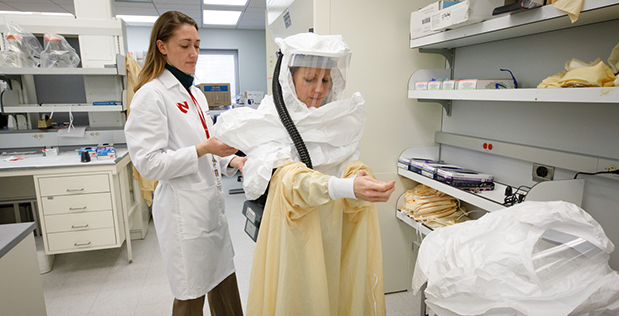DARPA tiene cuatro programas actuales dedicados a detectar rápidamente la exposición y / o infección por COVID-19 y amenazas CBRNE en individuos sintomáticos y asintomáticos.
As part of DARPA’s ongoing web series highlighting the agency’s active programs focused on COVID-19 medical countermeasures, this week we are focusing on supported research in the area of disease diagnosis.
DARPA has four current programs engaged in rapidly detecting COVID-19 exposure and/or infection in both symptomatic and asymptomatic individuals:
- Epigenetic CHaracterization and Observation (ECHO) – The Epigenetic CHaracterization and Observation (ECHO) program aims to build a point of service device that analyzes an individual’s epigenetic “fingerprint” to potentially reveal a detailed history of that individual’s exposure to pathogens, chemicals, or even weapons of mass destruction. DARPA envisions that the same technology could provide rapid diagnostics for individuals who may have been exposed to COVID-19, providing a timely signal to apply effective medical countermeasures.ECHO performer Fluidigm recently announced that a consortium of medical schools led by the Icahn School of Medicine at Mount Sinai is utilizing the Fluidigm Biomark HD microfluidics system and technology to create an epigenetic test for early detection of the novel coronavirus that causes COVID-19. This technology has significant potential to increase the speed and capacity of screening efforts, as microfluidics technology generates more data and uses a fraction of expensive testing reagents per precious sample as compared with more traditional, microwell plate-based PCR technology.The consortium is developing a test using real-time PCR detection for host detection assays targeting epigenome and viral RNA for early-stage host monitoring of potentially infected individuals. Labs will be able to generate more than 6,000 test results per day, with a single system supporting more than 2 million annual tests. An Emergency Use Authorization to the US FDA is pending.
- Prometheus – The Prometheus program is working to develop a molecular test for determining if an individual is likely to spread disease following exposure to an infectious agent and predict within 24 hours of exposure if that individual will become contagious.As part of the program, an international team of more than 120 scientists has detailed the impact of 75 over-the-counter prescription and development-stage drug compounds on SARS-CoV-2, the virus that causes COVID-19. Several of these agents show promise in blocking SARS-CoV-2 replication in laboratory experiments. One compound investigated in the research, a common ingredient in over-the-counter cough medicines, appears to have the potential to promote the growth of the virus.The collaborative study, published in Nature on April 30, 2020, was assembled and led by Nevan Krogan, PhD, director of the Quantitative Biosciences Institute at UC San Francisco and a senior investigator at Gladstone Institutes. Rather than focusing on an antiviral approach to block SARS-CoV-2, the researchers first combined biological and computational techniques to create a “blueprint” of more than 300 human proteins that the virus requires to infect human cells and to thrive and replicate in the body. They then explored the question of which drugs, both those that are currently marketed as well as those in development, might be repurposed to treat SARS-CoV-2 infection by targeting those human proteins.
- Friend or Foe – The Friend or Foe program aims to develop biosurveillance technology that can detect bacterial pathogens as, or even before, they threaten the military and homeland. The goal of the program is to quickly determine whether an unknown bacterium is harmless or virulent by directly identifying pathogenic behavior, avoiding conventional strategies that rely on known biomarkers.Performers are actively working, with one planning to submit initial data for publication this week. Please stay tuned for updates as they become available.
- SIGMA+ – DARPA SIGMA+, which is developing continuous city-scale real-time monitoring of the full spectrum of chemical, biological, radiological, and explosive (CBRNE) threats, achieved promising preliminary findings from two ongoing studies indicating that influenza can be detected prior to significant symptom onset using COTS wearable technologies. Early results suggest statistically significant changes in various heart rate-derived metrics indicating infection occurring prior (up to one day) to a person having symptoms or being asymptomatic.Listen to the latest episode of “Voices from DARPA” for information on this, as well as other critical research being conducted as part of Program Manager Mark Wrobel’s portfolio: http://www.darpa.mil/news-events/2020-05-21
In addition to these established programs, DARPA has also provided some preliminary funding to support Sherlock Biosciences, an Engineering Biology company who received Emergency Use Authorization (EUA) from the U.S. Food and Drug Administration (FDA) last week for its CRISPR SARS-CoV-2 kit for the detection of the virus that causes COVID-19, providing results in approximately one hour.
For more information on the highlighted programs, we invite you to visit the appropriate program page.
Please continue to follow this space for timely updates on DARPA’s portfolio of pandemic prevention efforts, including installments focused on the treatment, prevention, and manufacture of medical countermeasures to combat COVID-19.
Fuente: https://www.darpa.mil


